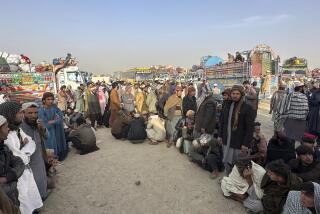Experts fear ousted Afghan Taliban will simply cross the border
- Share via
Pakistanis do not doubt that President Obama’s troop buildup will give U.S. and allied forces more wherewithal to uproot Taliban militants from their strongholds in Afghanistan.
What worries them is that the strategy will push Afghan Taliban over the porous border and bolster the ranks of brethren militants in Pakistan’s tribal areas, security experts say.
Pakistanis remain skeptical that Obama’s new blueprint for winning the war in Afghanistan will pacify their volatile, unstable neighbor to the west.
They put little, if any, trust in Afghan President Hamid Karzai, whose government has been crippled by widespread corruption, and they doubt that his army will be able to defend Afghanistan when American troops leave.
Pakistan’s most immediate worry, though, is that Obama’s plan to send an additional 30,000 U.S. troops could force Afghan fighters to seek refuge across the border with their Pakistani counterparts.
The Pakistani military is already stretched thin as it tries to hold on to territory taken from the Taliban in the northern Swat Valley and most recently in South Waziristan. If Afghan militants took up the Pakistani Taliban cause, the military’s ordeal would become more complicated.
“They will cross into Pakistan’s tribal areas and Baluchistan, and when that happens, Pakistan’s offensive against the Pakistani Taliban will suffer,” said Javed Hussain, a retired Pakistani brigadier general and now an Islamabad-based defense analyst.
Obama’s assurance that the presence of U.S. troops in Afghanistan is not indefinite is just as worrisome for Pakistanis. A pullout that leaves the Taliban intact probably would lead to an Afghan civil war on Pakistan’s doorstep, Hussain said.
That’s a prospect that keeps Pakistan from severing its long-standing ties with the Afghan Taliban, despite repeated protests from Washington.
“Pakistan has always had decent relations with the Afghan Taliban because we have to live next to them,” said Zafar Hilaly, who was an advisor to Prime Minister Benazir Bhutto. “If they agree to live in peace with us, so be it.”
-- Alex Rodriguez alex.rodriguez@latimes.com
More to Read
Sign up for Essential California
The most important California stories and recommendations in your inbox every morning.
You may occasionally receive promotional content from the Los Angeles Times.










